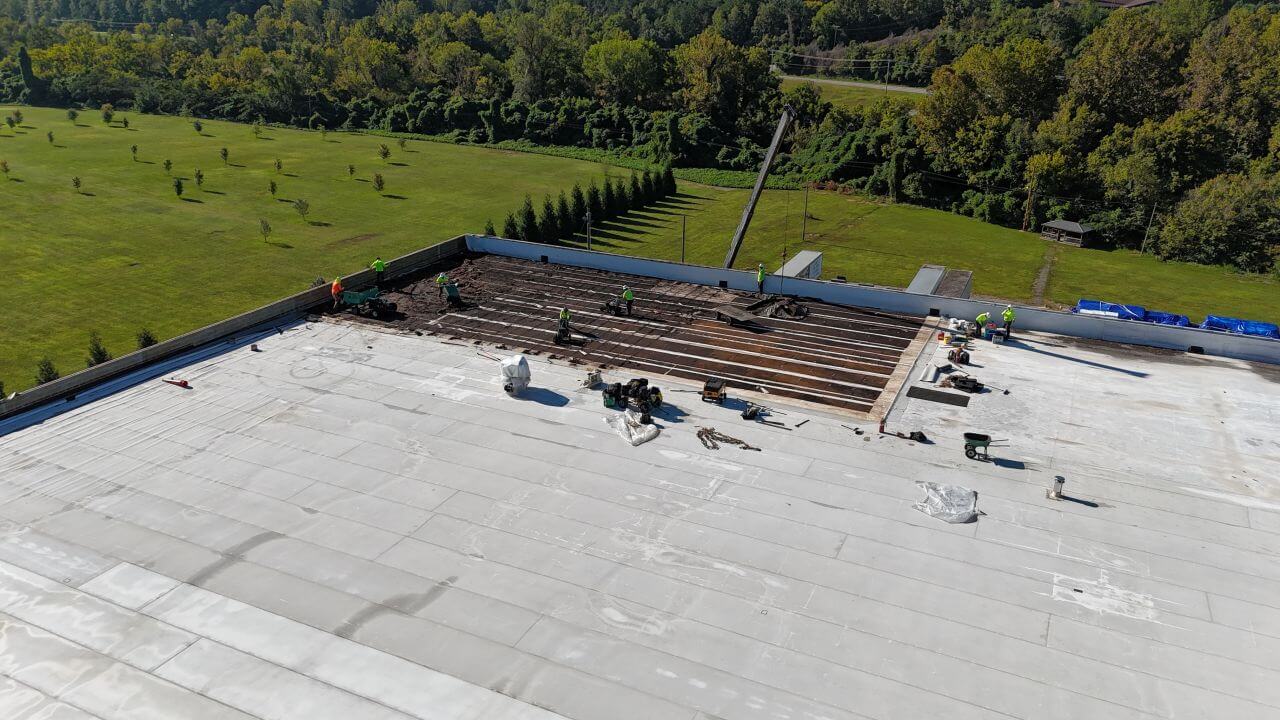Is PVC Roofing Right for My Business?

In the commercial roofing industry, choosing the right membrane system is one of the top decisions for facility owners. Let's explore whether PVC roofing is the right fit for your commercial building. From cost and performance to lifespan and use cases, this breakdown can help you confidently make a smart, long-term investment.
What Is PVC Roofing?
PVC (Polyvinyl Chloride) roofing is a single-ply thermoplastic membrane commonly used in flat or low-slope commercial applications. Featuring a PVC base layer reinforced with a scrim (fabric layer), and often plasticizers and UV stabilizers, PVC membranes range from 36 to 90 mils in thickness, typically around 50 mils. Unlike adhered seams in other systems, PVC roofs use heat-welded seams, creating a seamless, highly waterproof barrier.
Advantages of PVC Roofing
Exceptional Durability & Long Lifespan
PVC roofs can last 20–30 years or longer with proper maintenance. Heat-welded seams typically outperform other seams. The welds often exceed the strength of the membrane itself, reducing the risk of leaking.
Superior Chemical & Fire Resistance
PVC is highly resistant to chemicals, oils, grease, and fuels, ideal for restaurants, factories, and industrial sites. Fire-retardant properties are inherent; PVC self-extinguishes if the ignition source is removed, unlike some competitors.
Energy Efficiency ("Cool Roof")
White PVC membranes reflect 60-80% of sunlight and emit around 70% of absorbed heat, dramatically reducing internal heat gain. Studies show retrofitting black roofs with white reflective PVC can reduce surface temperature by around 50°F, which also helps reduce AC energy costs.
As a Duke Energy Smart $aver Business, Applied Roofing can help you save $0.10 per square foot when upgrading to a cool roof.
Recyclability & Environmental Profile
PVC membranes are made from recyclable materials, offering a greener solution and supporting LEED and ESG goals.
Reduced Maintenance Costs
PVC roofing generally requires less frequent maintenance than TPO or EPDM due to resistance to degradation.
Drawbacks of PVC Roofing
Higher Upfront Cost
PVC tends to cost slightly more (typically 5–10%) than TPO or EPDM. However, extended lifespan and lower maintenance can offset these costs over time.
Cold-Weather Sensitivity
PVC becomes more brittle in colder climates, risking cracks and punctures if stepped on prematurely.
Vulnerability to Punctures
Though puncture-resistant, harsh debris or foot traffic may cause damage. Proper installation and routine inspection are critical.
Incompatibility With Asphalt Products
PVC can't contact asphalt-based materials directly, requiring additional separation layers and installation steps.
Is PVC Roofing Right for Your Business?
Here are key considerations to decide if PVC fits your needs.
Ideal Use Cases
- Chemical-intensive environments like restaurants, factories, and warehouses.
- Buildings requiring enhanced fire resistance or strict safety codes.
- Regions with hot, sunny climates that are aiming for energy efficiency.
- Companies that are prioritizing durability and longer lifecycle cost savings.
- Projects targeting sustainability certifications, such as LEED.
- Highly trafficked roof areas
- Roof areas that require a lot of HVAC work
When PVC May Not Be Best
- Cold climates with frequent winter maintenance due to brittleness.
- Tight upfront budgets, though long-term ROI may offset.
- Situations where asphalt compatibility is needed without additional layers.
Best Practices & Maintenance Tips
To maximize PVC roofing benefits, choose a certified installer (like Applied Roofing Solutions) with heat-weld experience. Have your installation experts inspect seams and penetrations biannually, especially in spring and fall. Keep the surface debris-free to prevent puncture and pooling water. Ensure proper insulation and drainage to avoid thermal stress. Make early repairs to preserve the warranty (up to 30+ years for PVC).
Is a PVC Roof Right for Your Business?
If your business operates in chemical-intensive environments, requires resilient fire performance, wants to slash cooling costs, and is ready to invest for the long haul, PVC roofing is a compelling choice. With its durability, energy efficiency, and sustainability credentials, PVC often outperforms TPO and EPDM over its lifecycle.
That said, PVC isn't perfect for every scenario. In colder regions or tighter budgets, EPDM or TPO may fit better, especially with regular maintenance. However, a qualified roofing professional can help assess your building, budget, and roofing needs to find the best solution for you.
Choose Applied Roofing Solutions
For businesses seeking a long-lasting, efficient, and professional-grade roofing system, PVC roofing stands out, especially in commercial applications with high demands. It's more than a roof—it's a strategic investment.
Applied Roofing Solutions specializes in PVC roofing installation tailored to businesses throughout the NC Piedmont region, including Reidsville, Mayodan, Burlington, Madison, Mebane, Eden, Graham, and beyond. We also extend our commercial roofing services to Southwest Virginia, including Danville, Martinsville, Collinsville, Stuart, Stanleytown, and Patrick Springs.
You can explore our portfolio or contact our commercial roofing professionals to get started today!




